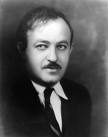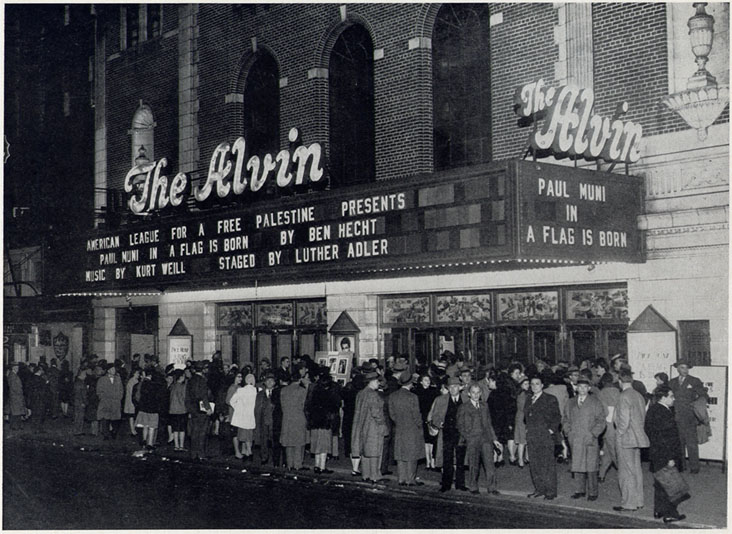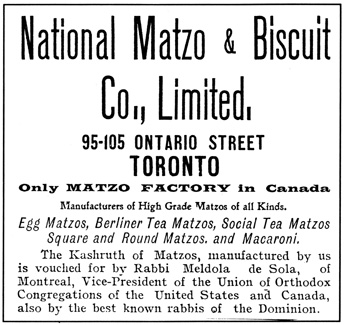Eighty years ago this summer, in June 1931, New York publisher Covici Friede announced that A Jew in Love, a new novel by Ben Hecht (1894-1964), had been banned in Canada and in bookstores in Boston and other American cities.
Anyone who opened the book — the front page of which described the Jewish protagonist as “a dark-skinned little Jew with a vulturous and moody face” — might reasonably have concluded that its many antisemitic caricatures were its main objectionable feature. Not so: it was the heretical utterance that “God is a pain in the ass” that sparked the various regional bans. (The last three words of the offending phrase were removed from subsequent editions.)
Despite the controversy and the book’s low artistic merit, A Jew in Love quickly sold 50,000 copies and made the bestseller charts of 1931, even as Jewish leaders across America denounced Hecht as a “self-hating Jew.” He likewise drew their ire for making public pronouncements that ridiculed American Zionists for “raising nickels for a lot of God damn stinking Jews in Palestine.”
Strange as it sounds, the prolific writer and scriptwriter underwent a remarkable transformations over the next decade to become one of America’s most effective public defenders of the Jewish people and Jewish statehood.
Born to Russian-Jewish parents in New York, Hecht grew up in the Midwest and became a prized newspaper columnist for a large Chicago daily. His first novel, Erik Dorn (1921) drew favourable reviews and was a bestseller. He wrote at lightning speed and once won a $2,500 bet by composing a publishable novel in less than two days with the help of amanuenses. Attracted by the bright lights of Hollywood, Hecht’s ability to craft a good screenplay in only four to six weeks put him much in demand, especially after the proven popularity of his play-turned-motion picture, The Front Page, co-written with Charles MacArthur (later remade as His Girl Friday).
 Hecht once observed that he “turned into a Jew in 1939,” just as the world was digging in for a protracted war. The reason, as he explained in his memoir A Child of the Century, was that he “bumped into history” and discovered his own Jewish identity. That same year, between his work on Gunga Din, ¬Wuthering Heights, Stagecoach and his uncredited polishing of dialogue in Gone With The Wind, he wrote the script for Let Freedom Ring, a patriotic movie promoting American democracy.
Hecht once observed that he “turned into a Jew in 1939,” just as the world was digging in for a protracted war. The reason, as he explained in his memoir A Child of the Century, was that he “bumped into history” and discovered his own Jewish identity. That same year, between his work on Gunga Din, ¬Wuthering Heights, Stagecoach and his uncredited polishing of dialogue in Gone With The Wind, he wrote the script for Let Freedom Ring, a patriotic movie promoting American democracy.
The rise of German anti-Semitism triggered a “Theodor Herzl moment” in Hecht which led to “his own reawakening as a proud, mobilized Jew,” McGill professor Gil Troy observed in a 2003 article. “Nazism offended Hecht personally. He fought back with the zeal of a convert and the indignation of a disturbed hermit.” In one typical article, My Tribe Is Called Israel, Hecht addressed American Jews who felt detached from Judaism to rise up to defend the Jewish people against the Nazis onslaught.
In 1943 he wrote We Will Never Die, a stage pageant that celebrated the Jewish contribution to civilization. In a 1944 book, A Guide for the Bedevilled, he outlined his own career as a lapsed and then reborn Jew, keen on a mission to write about Jews and anti-semitism — a task “that elates me more than any task to which I ever have set myself.”
In 1946 came A Flag Is Born, which promoted the establishment of a Jewish state. It featured the music of Kurt Weill and a cast that included Paul Muni, Celia Adler and a young unknown, Marlon Brando. The production raised a million dollars for the militant Jewish organization Irgun, a portion of which went to purchase a ship, the SS Ben Hecht, to bring Jewish refugees to Palestine. (The British boarded it and redirected it to Cyprus.)
Once a zealous denigrator of Jews, Hecht now became even more zealous in their defense. But when he placed a series of ads in major newspapers congratulating the Irgun for blowing up British trains in Palestine, he drew an angry response.
“There was nearly unanimous agreement that this time Hecht had gone too far,” Toronto author Doug Fetherling wrote in his 1977 book, The Five Lives of Ben Hecht. “The Zionists only grew angrier, and many of Hecht’s friends dropped away.” Hecht was blacklisted by cinema owners who refused to show any films with his name in the credits. Hecht also raised the money for the Altalena, an Irgun ship that the Israel Defense Forces destroyed in Tel Aviv harbour in June 1948 during the War of Independence.
Hecht has always been hard to pigeonhole because of his ability to jump mediums from newspapers to novels to stageplays to screenplays to propagandist for militant Zionism. Although he left behind a remarkable trail of credits that included several Hitchcock films (Spellbound, Notorious) and other Hollywood classics, his quick-witted brain ultimately served to bring him a measure of discredit as well. ♦
© 2011








